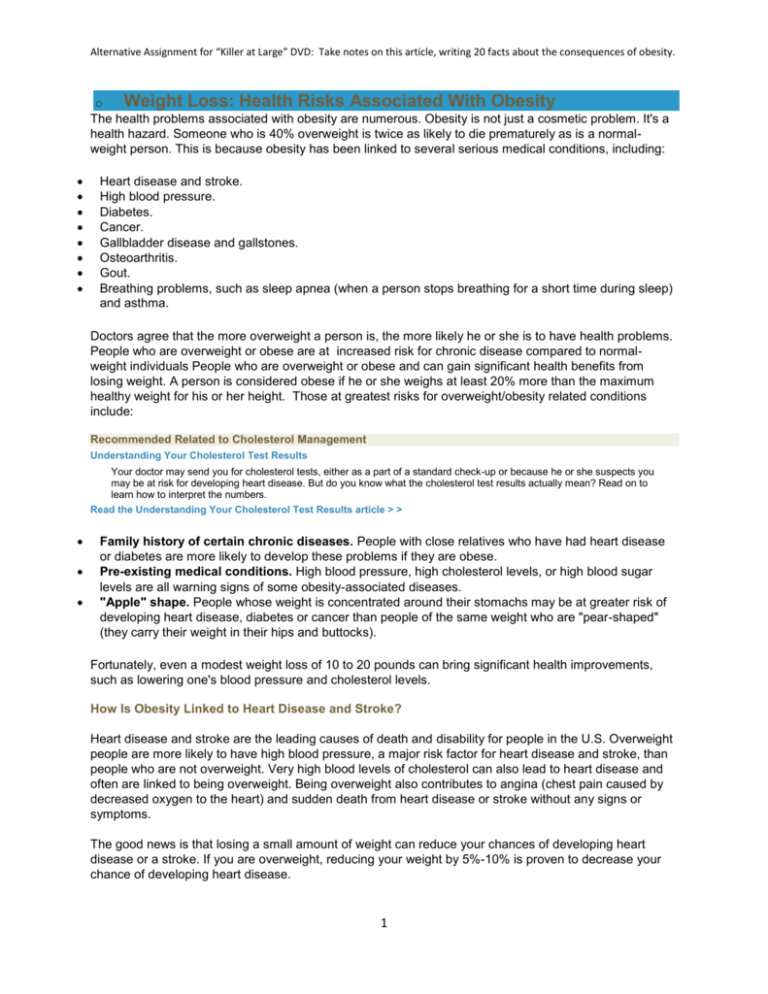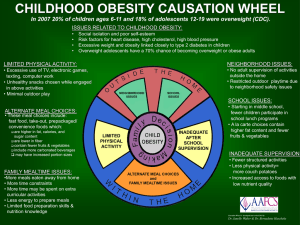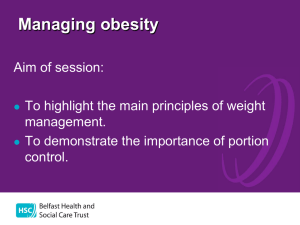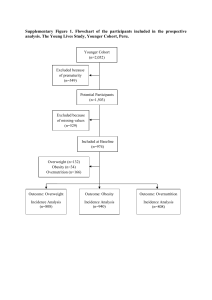
Alternative Assignment for “Killer at Large” DVD: Take notes on this article, writing 20 facts about the consequences of obesity.
o sWeight Loss: Health Risks Associated With Obesity
The health problems associated with obesity are numerous. Obesity is not just a cosmetic problem. It's a
health hazard. Someone who is 40% overweight is twice as likely to die prematurely as is a normalweight person. This is because obesity has been linked to several serious medical conditions, including:
Heart disease and stroke.
High blood pressure.
Diabetes.
Cancer.
Gallbladder disease and gallstones.
Osteoarthritis.
Gout.
Breathing problems, such as sleep apnea (when a person stops breathing for a short time during sleep)
and asthma.
Doctors agree that the more overweight a person is, the more likely he or she is to have health problems.
People who are overweight or obese are at increased risk for chronic disease compared to normalweight individuals People who are overweight or obese and can gain significant health benefits from
losing weight. A person is considered obese if he or she weighs at least 20% more than the maximum
healthy weight for his or her height. Those at greatest risks for overweight/obesity related conditions
include:
Recommended Related to Cholesterol Management
Understanding Your Cholesterol Test Results
Your doctor may send you for cholesterol tests, either as a part of a standard check-up or because he or she suspects you
may be at risk for developing heart disease. But do you know what the cholesterol test results actually mean? Read on to
learn how to interpret the numbers.
Read the Understanding Your Cholesterol Test Results article > >
Family history of certain chronic diseases. People with close relatives who have had heart disease
or diabetes are more likely to develop these problems if they are obese.
Pre-existing medical conditions. High blood pressure, high cholesterol levels, or high blood sugar
levels are all warning signs of some obesity-associated diseases.
"Apple" shape. People whose weight is concentrated around their stomachs may be at greater risk of
developing heart disease, diabetes or cancer than people of the same weight who are "pear-shaped"
(they carry their weight in their hips and buttocks).
Fortunately, even a modest weight loss of 10 to 20 pounds can bring significant health improvements,
such as lowering one's blood pressure and cholesterol levels.
How Is Obesity Linked to Heart Disease and Stroke?
Heart disease and stroke are the leading causes of death and disability for people in the U.S. Overweight
people are more likely to have high blood pressure, a major risk factor for heart disease and stroke, than
people who are not overweight. Very high blood levels of cholesterol can also lead to heart disease and
often are linked to being overweight. Being overweight also contributes to angina (chest pain caused by
decreased oxygen to the heart) and sudden death from heart disease or stroke without any signs or
symptoms.
The good news is that losing a small amount of weight can reduce your chances of developing heart
disease or a stroke. If you are overweight, reducing your weight by 5%-10% is proven to decrease your
chance of developing heart disease.
1
Alternative Assignment for “Killer at Large” DVD: Take notes on this article, writing 20 facts about the consequences of obesity.
How Is Obesity Linked to Diabetes?
Type 2 diabetes reduces your body's ability to control blood sugar. It is a major cause of early death,
heart disease, stroke, and blindness. Overweight people are more likely to develop type 2 diabetes
compared to normal-weight people. Most cases of type 2 diabetes can be attributed to being overweight
or obese. You can reduce your risk of developing type 2 diabetes by losing weight, eating a balanced
diet, getting adequate sleep, and exercising more. If you have type 2 diabetes, losing weight and
becoming more physically active can help control your blood sugar levels. Increasing your physical
activity may also allow you to reduce the amount of diabetes medication you need.
How Is Obesity and Cancer Linked?
Several types of cancer are associated with being overweight. Being obese increases the risk of dying
from cancer. Cancers of the colon, breast (postmenopausal), endometrium (the lining of the uterus),
kidney, and esophagus are associated with obesity. Some studies have also reported links between
obesity and cancers of the gallbladder, ovaries, and pancreas. For some types of cancer, such as colon
or breast, it is not clear whether the increased risk is due to the extra weight or to a high-fat, high-calorie
diet.
How Is Obesity Related to Gallbladder Disease?
Gallbladder disease and gallstones are more common if you are overweight. Your risk of disease
increases as your weight increases. It is not clear how being overweight may cause gallbladder disease.
Ironically, weight loss itself, particularly rapid weight loss or loss of a large amount of weight, can actually
increase your chances of developing gallstones. Modest, slow weight loss of about 1 pound a week is
less likely to cause gallstones.
How Does Obesity Cause Osteoarthritis?
Osteoarthritis is a common joint condition that most often affects the knee, hip, and lower back joints.
Carrying extra pounds places extra pressure on these joints and wear away the cartilage (tissue that
cushions the joints) that normally protects them.
Weight loss can decrease stress on the knees, hips, and lower back and may improve the symptoms of
osteoarthritis.
How Is Obesity Linked to Gout?
Gout is a disease that affects the joints that is caused by high levels of a substance called uric acid in the
blood. The large amount of uric acid can form into solid or crystal-like masses that deposit in the joints.
Gout is more common in overweight people and the risk of developing the disorder increases with higher
body weights.
Over the short term, certain dietary changes may lead to an attack of gout in people who have high levels
of uric acid or who have had gout before. If you have a history of gout, check with your doctor before
trying to lose weight.
How Is Obesity Linked to Sleep Apnea?
Sleep apnea is a serious breathing condition that is associated with being overweight. Sleep apnea can
cause a person to snore heavily and to stop breathing for short periods during sleep. Sleep apnea may
cause daytime sleepiness and even heart failure. The risk for sleep apnea increases as body weight
increases. Weight loss usually improves sleep apnea.
2
Alternative Assignment for “Killer at Large” DVD: Take notes on this article, writing 20 facts about the consequences of obesity.
Top Picks
How to Eat Healthier -- Your Way
Cholesterol 101: What Your Levels Mean
Learn to Manage Your Type 2 Diabetes
Unusual Ways to Quit Smoking
Diabetes and Heart Disease: 12 Signs to Watch For
Health Check: Psoriasis Ups Risks for Related Conditions
WebMD Medical Reference
SOURCES:
National Cancer Institute: "Obesity and Cancer Questions and Answers."
American College of Physicians.
The Obesity Society.
Reviewed by Brunilda Nazario, MD on January 04, 2011
© 2011 WebMD, LLC. All rights reserved.
©2005-2007 WebMD, Inc. All rights reserved.
WebMD does not provide medical advice, diagnosis or treatment.
3







